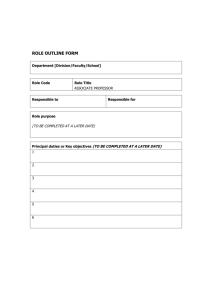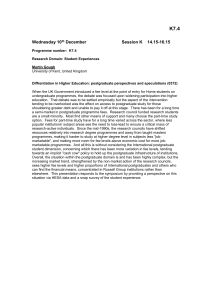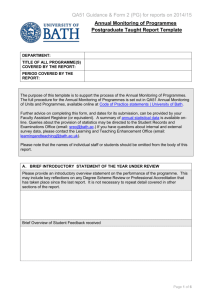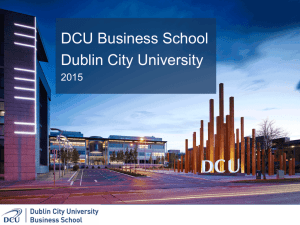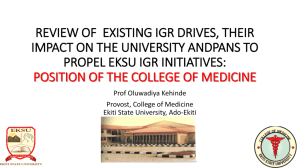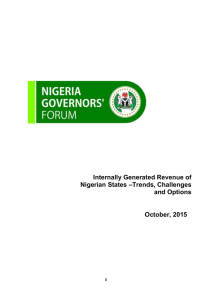institute of peace - a swot analysis - EKSU-Home
advertisement
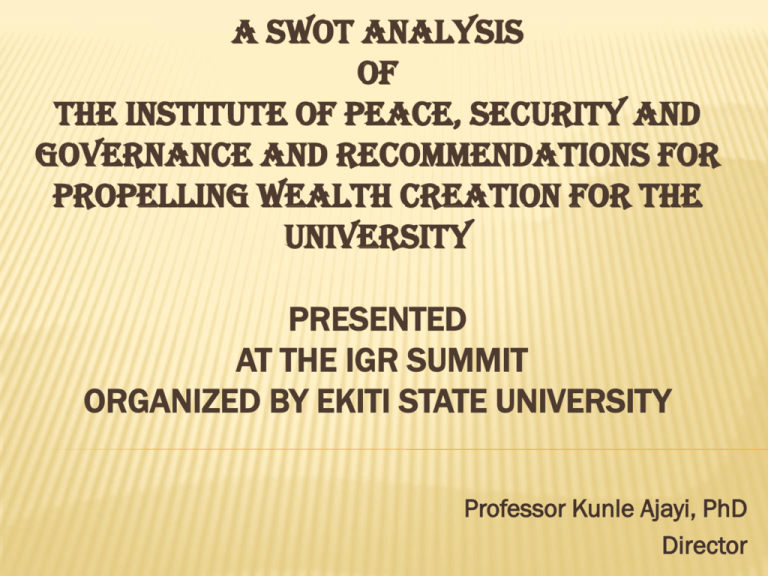
A SWOT ANALYSIS OF THE INSTITUTE OF PEACE, SECURITY AND GOVERNANCE AND RECOMMENDATIONS FOR PROPELLING WEALTH CREATION FOR THE UNIVERSITY PRESENTED AT THE IGR SUMMIT ORGANIZED BY EKITI STATE UNIVERSITY Professor Kunle Ajayi, PhD Director BACKGROUND INFORMATION The Institute of Peace, Security and Governance (IPSG) was established in February, 2014 as a postgraduate-based institute. The first set of students who were 55 in number resumed in January, 2015. STRATEGIC GOALS The strategic goals of the Institute are expressed as its mission and vision. MISSION To play a leading role in the repositioning of the State University among the best centers of excellence for the scientific study of the interface between governance, conflict, peace, human security and development nationally and globally. VISION To equip its graduates with specialized knowledge and skills to play effective professional and leadership roles in the public and private sectors for sustainable development. The Institute currently runs three postgraduate programmes through which it aims to its strategic goals. These are: 1. M. Sc. in Public Sector Governance and Administration (PGA) 2. M. Sc. in Corporate Governance and Management (CGM) 3. M.Sc. & PhD in Peace and Security Studies (PSS) IMPLEMENTATION STRATEGY AND CHALLENGES USING SWOT ANALYSIS The implementation of the strategic goals and objectives of the Institute can be expressed by examining the SWOT Analysis of the Institute. This will bring out its possibility capacities and challenges in terms of strength, weaknesses, opportunities and threats. S - Strength of the Institute W - Weaknesses of the Institute O - Opportunities of the Institute T - Threats to the Institute S - Strength of the Institute The major strengths of the Institute are: 1) The EKSU’s Institute of Peace, Security and Governance is the only Institute concerned with the running of a combination of three major programmes in Nigeria. Other universities in the country are only concerned with just one of the programmes. 2) The multidisciplinary nature of the Institute therefore makes it richer as a comprehensive knowledge provider with the capacity to train scholars and experts in the fields of Peace studies, Conflict studies, Security studies, Public governance studies, and Corporate/Private governance studies. 3) It is well positioned, especially in the Southwest of Nigeria, to serve as a monopoly institution with the advantage of capturing the knowledge-seeking market in terms of those seeking postgraduate admission to read any of the three specialized programmes of the institute. 4) The Institute is a postgraduate study-based centre. The only one of its kind in the country. It therefore has the capacity of capturing the postgraduate market as applicants from all states of the country could tap from this uniqueness and consequently offer more admission spaces than other departments running a combination of undergraduate and postgraduate courses. 5) The Institute is gradually building a reputation of timeline achievement of its set goals. This is in terms of students graduating without undue delay that characterized some of the PG programmes in the University. 6) The Institute is reversing this unenviable tradition by ensuring that course works do not exceed the stipulated period of two semesters. This is achieved through the personal touch of the Director with the lecturers and thereby ceaselessly soliciting for their cooperation on class attendance to teach the students. W - Weaknesses of the Institute i. No substantive Office Accommodation. i. Poor functioning of the University website. Poor functioning of the University website in terms of e-payment and e-application processes. Almost four months after placing advertisement on national daily newspapers calling for admission applications, many prospective applicants found it impossible to access the University website at their respective locations across the country, and thereby losing candidates and huge IGR that could have accrued to the University through the sale of e-forms. iii. No employment of substantive lecturers for the Institute. The Institute therefore relies on associate professors and lecturers from other Faculties and departments from the University. Most often, these lecturers too busy as they are equally saddled with other official assignments in the Faculties/departments and thereby warranting the personal appeals from the Director of the institute before the concerned lecturers could turn up for lectures. iv. Staffed with junior administrative staff. One Higher Executive Officer (HEO) is the highest administrative staff posted to the Institute. The Institute has no Administrative Secretary two years after founding it. The administrative staffs in the institute are therefore operating within limited administrative competence. O - Opportunities of the Institute i. The Institute is strategically located in Ekiti State. This is in the sense that, there is no other University or institution within reach running the programmes of the Institute. The implication of this is that, die-hard competitions for students will not be a problem. The three Masters programmes the Institute started with are relatively new and innovative, and therefore, would attract a lot of applicants for enrolment with good advertisement and easy access to the University website. ii. New Academic Programmes to harvest more students. In addition to the three major programmes approved for the Institute, it also has a tactical plan bordering on the introduction of Certificate, Diploma, Undergraduate and Postgraduate Diploma courses that will serve the needs of the of lower and middle levels manpower in Ekiti State and in Nigeria in general. T - Threats to the Institute i. Poor University Website/Internet Facilities. If the Internet/Web processing of application forms for admission remains unimproved upon, the Institute would lose students. The effect of the current inefficiency in the processing of on-line payments and e-applications is already taking its toll on the enrolment of students in the Institute. The 48 applications (many received off-line) fall short of the over 100 applications received last year. We commend the innovations being introduced by the Vice-Chancellor with the goal of improving the university’s ICT system and the Internet service system. ii. Continued reliance on associate lecturers is a major threat. Many of the lecturers being used by the Institute are too busy and therefore find it difficult to devote sufficient time for the lecturing and supervision of the students’ research works. CURRENT IGR STATUS OF THE INSTITUTE The Institute generates IGR for the University through the payment of the following fees by applicants and students: i. Application Forms ii. Admission Checking on the University website iii. Acceptance of Admission iv. Tuition fees v. Programme Due RECOMMENDATIONS FOR PROPELLING WEALTH CREATION FOR THE UNIVERSITY A.General Recommendations The economic fortunes of the University can be improved through outward and inward sourcing windows. The two windows can be combined into what is called PEST Analysis. P – Political Support E – Economic Investments S - Socio-cultural Opportunities T - Technological Knowledge Generation & Commercializing Discoveries This adaptational strategy is explained as follows: P – Political Support 1. Government continued financial support for the University because, ab nitio, it is its baby. 2. The State has to increase its subventions to the University on regular basis as to enable it continuous perform well and rise to become a World Class University. 3. Apart from the State Government, Local Government authorities must made to mandatorily support the University financially. 4. The Ekiti State House of Assembly should pass a bill approving a mandatory 10% University Support Funds (USF) as contributory deductions from the monthly statutory allocations of the 16 Local Governments in the State. E – Economic Investments The University must initiate opportunities to reduce financial dependence on the State. This it could do through the following means: 1) Establishing a Printing Press 2) Establishing a Sawmill. Ekiti State is a timber producing State with limited number of sawmills to process timber into different shapes of wood. The University is located in a forested place, and within an environment where there is no single sawmill located in the adjourning communities. Where one exists at all, it has become moribund. 3) Establishing Small Scale Agro Processing Industries. i. The Faculty of Agricultural Sciences of the University should be enabled to serve as a feeder of raw materials for small scale agro processing industries in the University. ii. Garri processing industry, Honey-making industry, Dry Pepper making, Juice making etc. can be established by the University with the Faculty of Agriculture sourcing the necessary raw materials through Faculty and students’ farms. iii. The University should give the Faculty IGR target to justify investments on it by the University. 4) Commercial Land Surveying & Architectural Designs i. Land Surveying & Architectural Designs by the Department of Geography & Planning and 4) Founding a Bakery Bread is a popular diet in Nigeria and Ekiti State. Bread making and bread merchandizing cannot therefore be failed enterprises if well managed. The University should establish its own bakery. If this is done, it will not take long before the illegal bread market at the gate will collapse. 5) Establishing a Petrol Station in Town Petroleum business has become a viable and sustained source of wealth in Nigeria if not mismanaged. No petroleum product can ever become unsold or un-patronized in terms of consumption by the public. 6) Production of GSM Credit Cards by the ICT Unit & Dept of Computer (Maths). Some businesses look small but yield huge profits. GSM credit card production is one of them. The University should obtain the production license from the MTN, GLO, Airtel and others. The University population alone is enough market for such enterprise to break even and make profits. 7) Building a Campus Shopping Complex & Row of retail shops, preferably along the road. 8) Externalizing Apprenticeship of the Directorate of Entrepreneurship with fees paid. 9) Other suggested commercial initiatives are: Weekend Video/ Film Shows/DSTV Football S - Socio-cultural Opportunities Converting opportunities that abound in the socio-cultural environment to economic advantage. Ekiti State is rich in culture and tradition, including those associated with Wedding and Burial ceremonies, Towns Annual Day Celebrations, traditional Festivals and other celebrations. All these can be converted to economic benefits by the University. This can be achieved through the following: 1. Re-Equipping & Commercializing the University Musical Band 2. Re-organizing, Equipping & Commercializing the University Choir Band 3. Re-Equipping and Commercializing the University theatre Troupe 4. Giving each of the groups above IGR targets to justify investments on them by the University. T - Technological Knowledge Generation & Commercializing Discoveries (Faculty of Engineering) 1) Enormous wealth is being wasted through the non-utility of discoveries by the University staff and students, especially in the Faculty of Engineering of the University. Groundbreaking research findings and innovations are turned out yearly but which always die like that without being encouraged to convert such findings into commercial status. The University should therefore set up a committee on how engineering innovations can be encouraged to generate IGR for the University and at the same time project the image of the University. 2) Manufacturing/Fabricating Small Scale/Simple Farming Mechanical Devices. Such as hand propelling Maize Shelling machine that can be sold to rural farmers at low costs;. Solar power devices. 3) University to give the Faculty IGR target to justify investments on it by the University. B:Specific New IGR Avenues by the Institute The Institute can particularly generate substantial IGR for the University through the following means: 1) Floating new Academic Programmes, namely: i. ii. iii. iv. v. vi. Short- term Certificate Programmes in all the 3 Programmes and others such as: Peace & Conflict Management; Security Alertness; Intelligence & Counter-Intelligence; Community Policing; Urban Policing; Small Arms Proliferation & Control; Cyber Crimes; Conflict Management & Diplomacy; Peace-making & Third Party Interventions; etc. Diploma Certificates in the three programmes Postgraduate Diploma in the three programmes Short-term Executive Master in PGA, CGM & PSS with higher school fees. Designing M. Phil & PhD degree programmes for the three programmes. Floating a Private Security Outfit (in collaboration with the University Security Unit) to provide private & corporate security for – public offices, banks, schools, hotels, construction sites, churches, mosques, event centres, during ceremonies & private homes. 2) Holding Professional/Academic Workshops at Regular Intervals with fees. Holding well-advertised Professional/Academic Workshops at regular intervals by the Institute will serve as complementary avenues of IGR for the University. This will include workshops for: i. Members of the Security Forces – Soldiers, Police, Nigeria Security &Civil Defence Corps, DSS, Prisons Service officials, Immigration etc. on topics such as Peace & Conflict Management; Security Alertness; Intelligence & Counter-Intelligence; Community Policing; Urban Policing; Small Arms Proliferation & Control etc. ii. Local Government Officials – on Revenue collection, Projects Monitoring & Evaluation, Financial Management & Corruption Control etc. iii. Banks & Bankers – on Corporate Governance, Financial management; Audit Control & Corruption Management etc. iv. Traditional Rulers & Chiefs – on Alternative Dispute Management v. Electoral Officials, Police, Civil Servants & Civil Society NGOs etc. vi. NEMA & SEPA officials, Police, Civil Defence, Social Workers, NGOs etc – on Humanitarian Disasters management & Early Warning System, on Refugees & IDPs management. Vii. Leadership, Change & Development. Vii.Training Private Security C: What is to be done and what steps to be taken by the University to Facilitate Achieving the above Recommendations? GAP Analysis to the Rescue. 1) The University needs to provide the enabling environment and conditions that will make efforts at achieving improved possible. 2) In discussing the required enabling conditions, we need to adopt the use of GAP Analysis. Gap Analysis evaluates the objective conditions on ground and identifies the missing gaps to be filled. 3) The Missing Gaps today in the University include: i. Poor Electricity Supply ii. Poor Water Supply iii. Poor Internet System/lack of functional web iv. Inadequate/Lack of Requisite Learning Facilities v. Staff Welfare – Regular payment of salaries & allowances vi. Irregular Annual Leave System for the Academic Staff vii. Low votes for Training & Re-training; viii. Inadequate Research Grants All existing lacunas, as identified above & others need to be speedily fixed by the University to enable staff and students contribute their quotas to the improved IGR drive of the University. Commendation: Thanking the VC for living up to his promise of paying salaries on the 25th of D: Instituting a Culture of Transparency & Accountability to Block IGR Leakages. All Colleges, Faculties, Directorates, Departments and Units of the University should be made to imbibe the culture of Transparency & Accountability through the following: i. Regular rendering of their financial accounts to the Vice-Chancellor on monthly or quarterly basis. Lacuna ii. The Vice-Chancellor should assume the role of Chief Executive Accounting Officer and Chief Executive Auditor for over-sight supervision/monitoring of accounts. iii. The VC should set up a University Subsidiary Accounts Monitoring Committee (SAC) to monitor the IGR and expenditure behaviour of all University units to detect leakages at the early stage. THANK YOU


